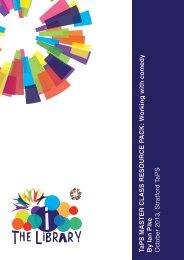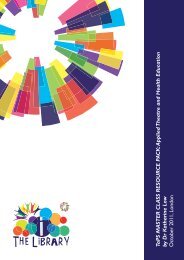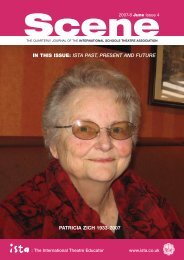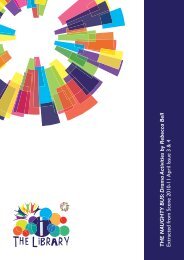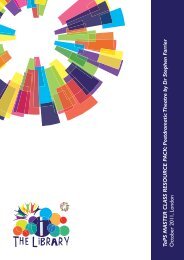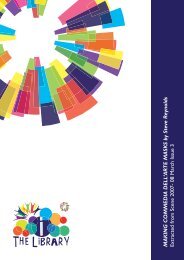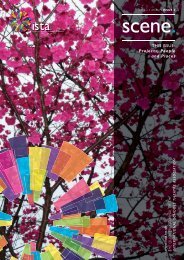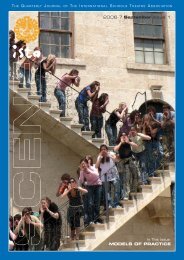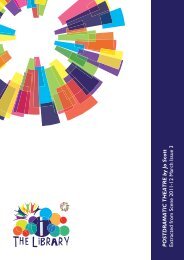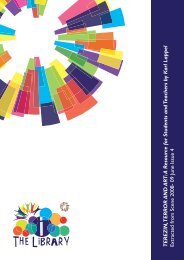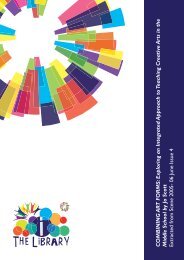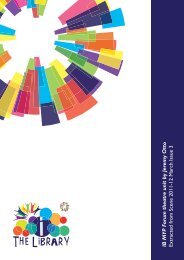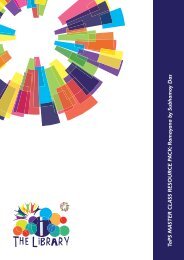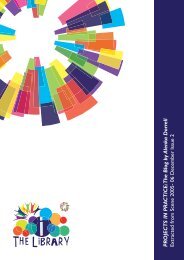ISTA/Scene March 07
ISTA/Scene March 07
ISTA/Scene March 07
Create successful ePaper yourself
Turn your PDF publications into a flip-book with our unique Google optimized e-Paper software.
community – sometimes they<br />
overshadow a dramatic performance<br />
but within an international community,<br />
it will be a musical that will bring the<br />
community together.<br />
THE COMEDY OF ERRORS by<br />
William Shakespeare<br />
Shakespeare can be difficult for MS<br />
students, and sometimes for teachers,<br />
but I decided to try my first<br />
Shakespeare play. Which one to<br />
choose It just so happened that I<br />
had tickets to see THE COMEDY OF<br />
ERRORS in the West End, London –<br />
and I was struck by both the simplistic<br />
and humorous way it was produced. I<br />
had found my Shakespeare play. Two<br />
week before auditions, students were<br />
able to drop by my room to read<br />
through the script and become familiar<br />
with the play. I spent many lunch<br />
periods and recess time talking with<br />
students about Shakespeare and THE<br />
COMEDY OF ERRORS. When I<br />
choose a play for MS students, I<br />
always try and find a theme that would<br />
be relevant to their life experiences.<br />
This Shakespeare play was a perfect<br />
choice to explore identity – which is a<br />
major issue for adolescent-aged<br />
students.<br />
With a 10-week rehearsal schedule,<br />
we spent the beginning weeks<br />
exploring the language and how to<br />
create ‘normal’ dialogue with the<br />
verse. During this time, we had the<br />
good fortune to participate in a<br />
Shakespeare workshop at the Globe<br />
Theatre, exploring themes of the play.<br />
We even had a chance to act out<br />
some scenes on the stage. This was<br />
an invaluable experience for the cast.<br />
Our set was all white with revolving<br />
doors, which were metaphors for the<br />
changing identities. Both set of twins<br />
were dressed the same and the action<br />
was more Commedia dell’ Arte than<br />
Shakespeare. The cast had a ball<br />
doing this play and their interest in<br />
Shakespeare grew. For me THE<br />
COMEDY OF ERRORS was an easy<br />
and funny play to do with MS<br />
students. It was very accessible as an<br />
introduction to Shakespeare. Again, I<br />
used MS students as crew, lighting<br />
and sound people for the production.<br />
THE ODYSSEY adapted by David<br />
Calcutt<br />
The ODYSSEY is a wonderful play to<br />
do because it touches on many<br />
adolescent issues such as identity,<br />
transition, friendship, risk-taking, love,<br />
etc. Another reason for choosing THE<br />
ODYSSEY was my policy of allowing<br />
anyone who auditions to be involved in<br />
the play as either cast or crew. Usually<br />
I get around 30-40 students<br />
auditioning for the MS play so I always<br />
try to choose a play with a large and<br />
flexible cast.<br />
THE ODYSSEY proved to be an<br />
amazing experience for both cast and<br />
myself. During the early stages of the<br />
rehearsal process, we explored the<br />
story and improvised each adventure<br />
Odysseus experienced. I also began<br />
to explore with the cast the concepts<br />
of ritual and storytelling. The<br />
adaptation focused on the concept of<br />
a story within a story – which made it<br />
easier for both the cast and audience<br />
to understand the story and to allow<br />
monsters and Cyclops to appear on<br />
stage by using effigies for these<br />
creatures. The staging was simple –<br />
chairs for listeners of the story in the<br />
play and the floor for the actors telling<br />
the story. 9th grade students who<br />
were studying THE ODYSSEY in class<br />
talked to the cast about the story. The<br />
characters created their own dance<br />
and rituals needed in the play.<br />
Through the exploration and<br />
development of rituals, the cast<br />
became closer to each other and a<br />
real ensemble experience was created<br />
for all involved. I also had a high<br />
school assistant director who worked<br />
with the students. My designer<br />
designed every costume and we had<br />
parents make them. It was quite an<br />
adventure – just like the journey in the<br />
story. It was a fascinating experience<br />
bringing together parents, cast and<br />
crew to work on one adventure –<br />
which was an odyssey in itself.<br />
Calderdale HS<br />
Steve Reynolds – United World<br />
College of Li Po Chun, Hong Kong<br />
WOZA ALBERT by Percy Mtwa,<br />
Mbongeni Ngema and Barney<br />
Simon<br />
The play was presented by IB Theatre<br />
Arts students as their year two/end of<br />
course production. It was the<br />
culmination of their African theatre unit<br />
as well as a celebration (and closure)<br />
of the course as a whole. The play<br />
features two actors playing a variety of<br />
characters with a basic (easy to<br />
prepare) staging. It is fast moving,<br />
funny and very physical, but also<br />
focuses on the serious issue of racism<br />
through its Apartheid South African<br />
setting. We split the play into four<br />
sections and two different students<br />
played the characters in each section<br />
(because there are so many characters<br />
there is little need for character<br />
development). A student director was<br />
then appointed for each unit. So, the<br />
students owned the material and I as<br />
teacher just oversaw the production<br />
values and transitions between each<br />
unit. We rehearsed over an 8-week<br />
period (the separately run units made<br />
simultaneous rehearsals easy), in<br />
lessons and after school. We explored<br />
the history of South Africa and physical<br />
theatre skills before focusing on the<br />
text and delivered a studio<br />
performance over three nights to the Li<br />
Po Chun college community.<br />
THE LIST by Steve Reynolds<br />
This play was presented by the Dar es<br />
Salaam Young Peoples Theatre, a<br />
youth group that was based in the<br />
International School of Tanganyika and<br />
open to all local young people (no<br />
auditions – inclusive entry). The group<br />
was dedicated to producing plays<br />
<strong>Scene</strong> | 2006-7 <strong>March</strong> Issue 3 | 19



